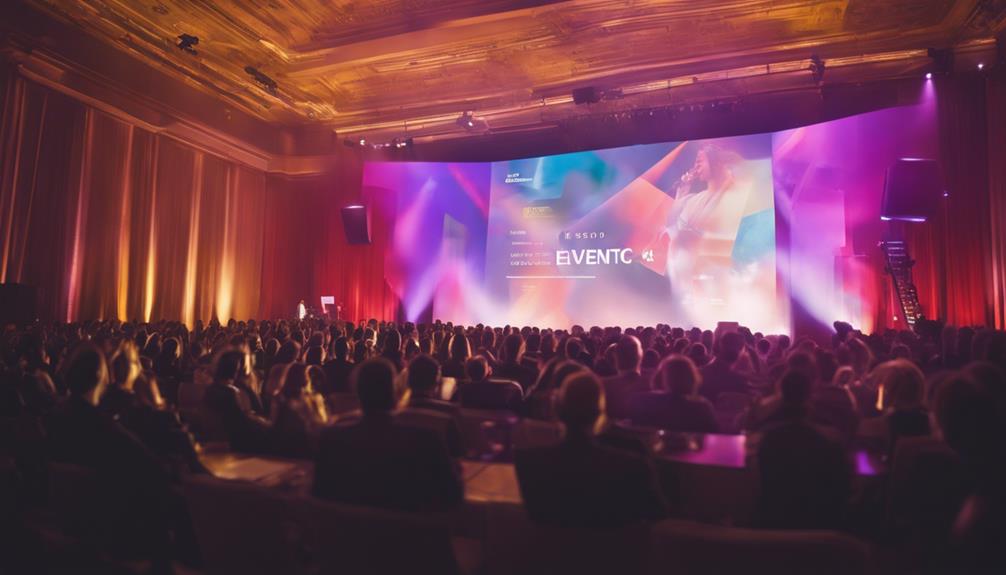Mastering the art of speaker selection can elevate your event and create a lasting impact. Start by defining your event's objectives, whether you want to educate or inspire. Look for speakers who blend expertise with charisma, engaging the audience with dynamic presentations. Research their past performances and audience feedback to ensure a good fit. Understand their fees and align your budget accordingly. Lastly, secure clear logistics and communication to foster an engaging atmosphere. You'll not only make informed choices but also create connections that resonate—discover more strategies to enhance your speaker selection process. Consider diversifying your speaker selection to represent a range of perspectives and backgrounds. This can lead to a more inclusive and captivating event, appealing to a wider audience. By offering diverse public speaking opportunities, you can create a platform for different voices and experiences to be heard, ultimately enriching the overall event experience.
Key Takeaways
- Clearly define your event's purpose and desired outcomes to guide speaker selection.
- Research potential speakers' expertise, past engagements, and audience feedback for alignment.
- Evaluate the speaker's presentation style and energy to ensure audience engagement.
- Consider logistical aspects, including budget and venue requirements, for seamless execution.
Understanding Event Objectives
To select the right speaker, you need to clearly understand your event's objectives and what you want attendees to take away from the experience.
Start by defining the purpose of your event—whether it's to educate, inspire, or entertain. Consider the theme and how it aligns with your goals. Are you aiming for skill development or motivation?
Identify desired outcomes, such as specific knowledge or actionable insights. This clarity will guide you in selecting a speaker who resonates with your audience.
Remember, the right speaker can significantly influence the event's success, so take the time to evaluate how their message aligns with your objectives.
Ultimately, understanding these elements will help you create a meaningful experience for your attendees.
Defining Ideal Speaker Characteristics
An ideal speaker possesses a blend of expertise, charisma, and relevance that captivates your audience and aligns seamlessly with your event's objectives.
You should look for someone who's not only knowledgeable in their field but also can engage listeners with their dynamic presentation style.
Authenticity is key; a relatable speaker can create a genuine connection with attendees.
It's important that they understand your event's theme and can tailor their message accordingly, ensuring it resonates with the audience.
Additionally, consider their ability to inspire action or provoke thought, as impactful speakers leave a lasting impression.
Lastly, their flexibility in adapting to your event's needs can make all the difference in delivering a successful experience.
Conducting Speaker Research

Thorough speaker research is crucial for finding the perfect match for your event's goals and audience. Start by reviewing potential speakers' past engagements and audience feedback to gauge their effectiveness.
Look for speakers who specialize in your event's theme and have a proven track record of engaging audiences. Assess their presentation style and energy levels—do they connect well with listeners?
Check their availability and willingness to customize their content for your needs. Validate their credibility through testimonials and references from previous events.
This diligent research process ensures you choose a speaker who not only aligns with your event's objectives but also captivates and inspires your audience. Your efforts now will lead to a successful and impactful event.
Analyzing Speaker Fees
How much you're willing to invest in a speaker can significantly impact the quality and relevance of your event.
Speaker fees can range from $500 to $10,000 based on experience and demand. Remember, well-known speakers often command higher fees due to their reputation.
If you want a customized presentation, be prepared for additional costs.
Also, consider your audience size; larger groups may require more extensive preparation and engagement from the speaker.
Engagement types matter too—fees can differ for keynote speeches compared to workshops.
To ensure you get the best value, clarify your budget early on and be open to negotiating terms with potential speakers.
Balancing quality and cost is key to your event's success.
Setting Event Logistics

Setting up the event logistics is crucial to ensure everything runs smoothly on the day of the event.
Begin by confirming your venue's specifications, including capacity and layout, to accommodate attendees effectively.
You'll want to coordinate audio-visual requirements, ensuring the necessary equipment is available and functioning.
Create a detailed timeline for the day, including arrival times for the speaker, set-up periods, and breaks.
Don't forget to arrange for refreshments if applicable, as this can enhance attendee engagement.
Communicate clearly with your selected speaker about their needs and preferences, ensuring alignment with your logistics.
Lastly, establish contingency plans for potential issues, like technical difficulties or last-minute changes, so you're prepared for anything that comes your way.
Crafting a Speaker Contract
Once you've nailed down the event logistics, it's time to focus on crafting a comprehensive speaker contract that clearly outlines expectations and responsibilities.
Start by detailing the speaker's obligations, including presentation topics and duration.
Specify payment terms, including the total fee, deposit requirements, and payment schedule.
Don't forget to include logistical arrangements such as travel, accommodations, and technical needs.
Address cancellation policies, outlining conditions under which either party can cancel without penalty.
Finally, incorporate clauses for confidentiality and intellectual property rights to protect both your interests and the speaker's content.
Ensuring Event Success

To ensure your event's success, it's crucial to align every detail with your goals and audience expectations.
Start by clearly defining the event's purpose and desired outcomes. Choose a speaker whose expertise matches these objectives, and research their past engagements to gauge their effectiveness.
Consider logistics, such as venue setup and audio-visual needs, to create an engaging atmosphere. Establish a clear timeline for communication and rehearsals to prepare your speaker adequately.
Don't forget to create contingency plans for potential issues like cancellations or technical difficulties.
Finally, keep the lines of communication open with your speaker, ensuring they understand your vision.
With careful planning and execution, you'll maximize the impact of your event and leave attendees satisfied.
Frequently Asked Questions
How Do I Approach a Speaker for the First Time?
When you approach a speaker for the first time, introduce yourself clearly, explain your event's purpose, and express why you think they'd be a great fit. Keep it friendly and professional to establish rapport.
What Should I Include in a Speaker's Briefing Document?
When creating a speaker's briefing document, include event details, audience information, key themes, desired outcomes, logistical arrangements, and any specific content requests. This ensures your speaker's prepared and aligned with your event goals.
How Can I Evaluate Audience Engagement During the Speech?
To evaluate audience engagement during the speech, observe their body language, eye contact, and reactions. You can also gather feedback through polls or open discussions afterward to assess their understanding and interest in the topic.
What Are Common Pitfalls to Avoid in Speaker Selection?
When selecting a speaker, avoid common pitfalls like overlooking audience fit, neglecting research on past performances, ignoring budget constraints, and failing to communicate expectations. Each can lead to disappointing outcomes and missed engagement opportunities.
How Can I Manage Speaker Expectations Before the Event?
To manage speaker expectations, communicate clearly about event goals, logistics, and audience demographics. Discuss the presentation format and content, ensuring alignment. Regular check-ins and updates will help keep everyone informed and engaged leading up to the event.
Conclusion
In conclusion, mastering the art of speaker selection is vital for your event's success.
By clearly understanding your objectives, defining the characteristics of your ideal speaker, and conducting thorough research, you can make an informed choice.
Don't forget to consider logistics and negotiate fees to ensure a good fit.
With the right speaker, you'll inspire and engage your audience, leaving them with valuable takeaways and a memorable experience.
Your careful planning will truly elevate your event!










